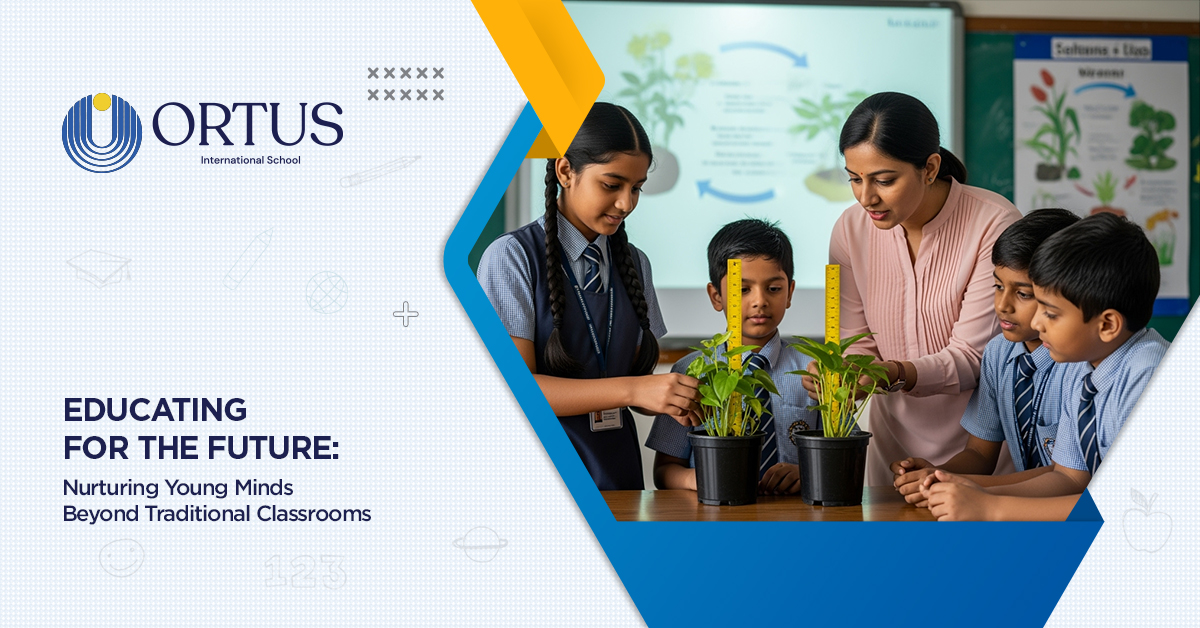Educating for the Future: Nurturing Young Minds Beyond Traditional Classrooms

Imagine a world where children learn through curiosity, creativity, and real-world experiences. This is not a futuristic dream; it is the reality of progressive education today. The concept of learning has evolved dramatically, shifting from chalkboards to smartboards, from rote memorisation to skill development, and from confinement to classrooms to boundless exploration.
As young learners step into a rapidly changing global landscape, education must not only keep up but also lead the way. Schools that embrace this evolution are shaping tomorrow’s leaders, thinkers, and innovators.
Beyond the Four Walls
Traditional classroom models often rely on passive learning, where students listen, memorise, and repeat. But the world has moved on, and so have children’s learning methods and needs. The future demands creative thinkers, problem-solvers, emotionally intelligent individuals, and digital natives.
That’s why moving beyond traditional classrooms is more than a trend, it’s a necessity. By encouraging exploration and hands-on learning, schools empower students to take ownership of their education.
Learning that Mirrors Life
Modern education introduces real-life learning, where students actively participate in solving problems, collaborating with peers, and questioning the status quo. Inquiry-based and experiential learning methods are at the forefront of this change.
A child who plants a garden, codes a robot, or produces a short film learns far more than what any textbook can provide. These experiences nurture critical thinking, emotional intelligence, and communication skills, all essential for life beyond school.
The Role of Future-Ready Campuses
A school’s environment can shape the child’s relationship with learning. Very few schools in the city understand this profoundly; one of them is Ortus International School, which makes it the top international school in Kokapet, Hyderabad. It offers futuristic facilities and a global curriculum that focuses on holistic development rather than just academic success.
Innovation Through Choice-Based Education
The best schools today don’t just teach, they inspire. One example is Ortus International School, which offers both Cambridge and CBSE curricula. What makes it the best CBSE school in Kokapet is its Choice-Based Education. This model allows children to explore their interests and talents while learning essential subjects.
Choice-Based Education supports differentiated learning, acknowledging that no two children are alike. By allowing students to have a say in their learning journey, it nurtures intrinsic motivation and builds self-confidence.
Technology as a Learning Ally
Technology is not replacing teachers, it’s enhancing learning. From AI-powered learning platforms to virtual reality field trips, technology personalises education and makes it more engaging.
Students can even explore the human body in 3D, write code for robots, or connect with classrooms across the world. These interactive experiences expand horizons, making learning more meaningful and memorable.
Creating Empathetic Global Citizens
The best schools go beyond academics. They develop empathy, awareness, and responsibility in students. Ortus, a top international school in Kokapet, Hyderabad, includes global perspectives in its curriculum, helping students understand diverse cultures and viewpoints.
This approach prepares them to become informed, compassionate, and responsible global citizens, a necessity in today’s interconnected world.
Beyond Tests: Focusing on Skills and Mindsets
Success is no longer defined by exam scores alone. Skills such as collaboration, adaptability, digital literacy, and emotional intelligence are now vital.
Ortus International School instils a growth mindset in students, which makes it the best CBSE school in Kokapet. Here, failure is seen as part of learning, where students are encouraged to take risks, reflect on mistakes, and persist with resilience traits crucial for both personal and professional growth.
Learning Never Stops—Even at Home
The transition to future-ready education is incomplete without support from home. Parents play a critical role in encouraging curiosity and independence. This might mean discussing world news at dinner, playing strategy games, or exploring science kits over the weekend.
Educators, too, can work in partnership with parents to support continuous learning. Schools that share regular feedback, host workshops, and create interactive assignments help bridge the home and school environments.
The Path Ahead: A Culture of Lifelong Learning
Ultimately, the goal is to cultivate a culture where learning is a lifelong journey. The leaders of tomorrow must be agile learners, capable of adapting to new challenges and technologies.
Schools that nurture curiosity, innovation, and empathy will prepare students for futures we can’t yet imagine. In a world of constant change, the ability to learn, unlearn, and relearn will be a student’s greatest strength.
Conclusion
Education today is not just about what children know but about who they become. By moving beyond traditional classrooms and embracing future-ready learning environments, this generation of learners will grow to become confident, capable, and compassionate individuals.
Whether it's the top international school in Kokapet, Hyderabad, or the best CBSE school in Kokapet, what matters most is the commitment to nurturing young minds to think critically, dream boldly, and act with purpose.
At Ortus International School, learning goes far beyond textbooks. Every corridor, classroom, and conversation is designed to ignite curiosity and build future-ready skills. With a globally benchmarked curriculum, state-of-the-art infrastructure, and a deeply personalised learning approach, Ortus empowers students to lead with empathy, innovate with purpose, and thrive in an ever-evolving world.
FAQs
1. Why is it important to move beyond traditional classroom education?
Traditional classrooms often focus on memorisation and standardised tests, which do not prepare students for real-world challenges. Moving beyond them encourages creativity, critical thinking, and emotional intelligence skills essential for success in today’s rapidly changing world.
2. What are some effective alternatives to traditional classroom learning?
Alternatives include project-based learning, inquiry-based education, experiential activities, Choice-Based Education, and digital learning platforms. These methods promote hands-on learning, personal interest exploration, and real-world problem-solving.
3. How can parents and educators support future-ready learning at home or in school?
Parents can nurture curiosity through discussions, activities, and exploration. Educators can offer personalised learning experiences, use technology meaningfully, and provide emotional and academic support. Both should work together to create a holistic learning environment.